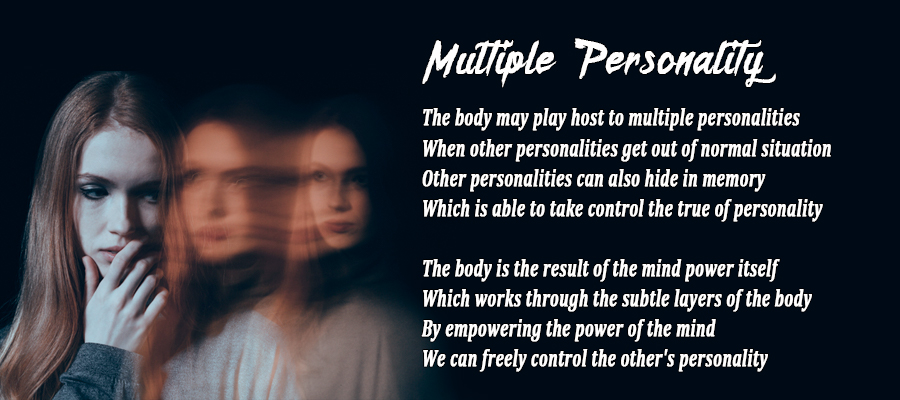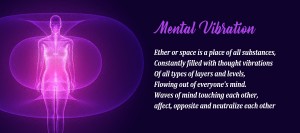Dissociative identity disorder (DID) is a rare condition in which two or more distinct identities, or personality states, are present in and alternately take control of an individual. Some people describe this as an experience of possession. The person also experiences memory loss that is too extensive to be explained by ordinary forgetfulness.
Multiple Personality Disorder (MPD) / Dissociative identity disorder (DID) causes the sufferer to express many different personalities. Each personality is distinct. Each personality has particular characteristics and tendencies. Each personality has a unique set of memories. Different personalities often respond to different names. Some have talents, such as being able to play a musical instrument, that the other personalities do not have. Some personalities can even speak foreign languages that the others cannot.
DID was called multiple personality disorder up until 1994, when the name was changed to reflect a better understanding of the condition namely, that it is characterized by a fragmentation or splintering of identity, rather than by a proliferation or growth of separate personalities. The symptoms of DID cannot be explained away as the direct psychological effects of a substance or of a general medical condition.
MPD reflects a failure to integrate various aspects of identity, memory, and consciousness into a single multidimensional self. Usually, a primary identity carries the individual’s given name and is passive, dependent, guilty, and depressed. When in control, each personality state, or alter, may be experienced as if it has a distinct history, self-image and identity. The alters’ characteristics—including name, reported age and gender, vocabulary, general knowledge, and predominant mood contrast with those of the primary identity. Certain circumstances or stressors can cause a particular alter to emerge. The various identities may deny knowledge of one another, be critical of one another, or appear to be in open conflict.
In many parts of the world, possession states are a normal part of a cultural or spiritual practice. Possession-like identities often manifest as behaviors under the control of a spirit or other supernatural being. Possession states become a disorder only when they are unwanted, cause distress or impairment, and are not accepted as part of a cultural or religious practice.
Symptoms of Multiple Personality Disorder
According to the DSM-5, the following criteria must be met for an individual to be diagnosed with dissociative identity disorder:
- The individual experiences two or more distinct identities or personality states (each with its own enduring pattern of perceiving, relating to, and thinking about the environment and self).
- Some cultures describe this as an experience of possession.
- The disruption in identity involves a change in sense of self, sense of agency, and changes in behavior, consciousness, memory, perception, cognition, and motor function.
- Frequent gaps are found in the individual’s memories of personal history, including people, places, and events, for both the distant and recent past. These recurrent gaps are not consistent with ordinary forgetting.
- The symptoms cause clinically significant distress or impairment in social, occupational, or other important areas of functioning.
Particular identities may emerge in specific circumstances. Transitions from one identity to another are often triggered by psychosocial stress. In the possession-form of dissociative identity disorder, alternate identities are visibly obvious to people around the individual. In non-possession-form cases, most individuals do not overtly display their change in identity for long periods of time.
Sometimes people with MPD experience dissociative fugue in which they discover, for example, that they have traveled, but have no recollection of the experience. They vary in their awareness of their amnesia, and it is common for people with MPD to minimize their amnestic symptoms, even when the lapses in memory are obvious and distressing to others.
Less well known is that each personality also undergoes distinct physiological changes some quite dramatic when transitioning (in a time period ranging from seconds to minutes) from one personality to the next.
Dr. Philip M. Coons, who compiled the results of over fifty studies regarding physiological changes among MPD sufferers, documents that the rapid physiological changes of MPD sufferers have been measured using modern medical devices and techniques including electroencephology, visual evoked responses, galvanic skin responses, electromyography, regional cerebral-blood-flow monitoring, voice spectral analysis, brain electrical activity mapping, and electrocardiography.
Measurements taken using these instruments as well as systematic observational methods leave no doubt that physiological changes do emerge when one personality changes to another. In other words, what you are about to read are not unfounded claims. These phenomena are well-documented and were measured using sophisticated scientific instruments.
The fascinating list of physiological anomalies found among MPD sufferers goes on and on. But all the strange and unusual clinically-observed phenomena have one thing in common they are all impossible at least according to the conventional biochemical model of how our bodies work. The body-as-a-biological-machine concept provides no explanation for how any of these phenomena could have happened.
The Power of Deeply Held Conviction
So how and why does this happen?
One thing we know is that the different personalities of an MPD sufferer are quite convinced of their own unique identity there’s often no awareness by one personality of there being any other personalities at all. Many MPD sufferers are discovered because they come to doctors complaining of amnesia. They know they are missing large segments of memory but have no idea that another personality, or other personalities, are living their lives during the times of their memory loss.
You could say that each personality has its own subconscious mind that contains its own unique memories, habits, abilities, and, most importantly fundamental mental convictions about their body shape and health.
As each personality emerges with its unquestioningly held, deeper-than-conscious convictions about that personality’s appearance, state of health, and physical abilities, each personality’s body immediately changes to conform to those convictions.
Once MPD sufferers shift into new personalities, each personality has the absolute conviction that its body will be as it expects that body to be the drug-user personality expecting to see needle tracks on his arms, or the woman expecting to see green eyes looking back at her in the mirror, even though all the other personalities that share that body have brown eyes.
Because nearly all of us have only one personality, one subconscious mind, one cohesive set of fundamental mental convictions about our body shape, appearance and health, we don’t see such rapid changes of form as do MPD sufferers.
MPD sufferers’ bodies change instantly and seemingly miraculously when their fundamental convictions change with each emerging personality, because their change of convictions changes their holographic energy body every time a new personality comes into conscious control of the body.
The instantaneous physical changes of MPD sufferers reveals the ongoing miracle that we are all constantly performing.
The body is the result of the mind power itself which works through the body of subtle energy.
Developing the ability to change the mind that is held fast, could immediately change the physical body at will
That is the difference between the saints and sages and us: they have developed the ability to change not only their deeply held thoughts about their own bodies but about all physical forms.





